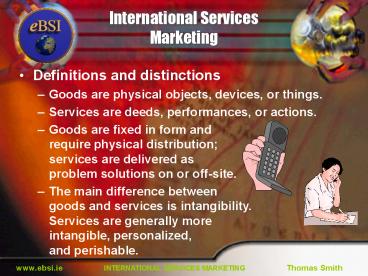International Services Marketing - PowerPoint PPT Presentation
1 / 17
Title:
International Services Marketing
Description:
Airlines. Intangible. Tangible. www.ebsi.ie INTERNATIONAL SERVICES MARKETING Thomas Smith ... personnel to convey the spirit, values, and attitudes of the ... – PowerPoint PPT presentation
Number of Views:32
Avg rating:3.0/5.0
Title: International Services Marketing
1
International Services Marketing
- Definitions and distinctions
- Goods are physical objects, devices, or things.
- Services are deeds, performances, or actions.
- Goods are fixed in form and require physical
distribution services are delivered as problem
solutions on or off-site. - The main difference between goods and services
is intangibility. Services are generally more
intangible, personalized, and perishable.
2
Nature of servicesGoods vs Services
- Intangibility
- Heterogeneity (Variability)
- Perishability
- Simultaneous Production and Consumption
3
Nature of servicesGoods vs Services
- Nature of the output (Performance)
- Customer involvement in production
- People as part of the service
- Likelihood of QC problems
- Difficult to evaluate
- Lack of inventories\
- Greater importance of time factor
- Electronic channels of distribution
4
Linkage between Services and Goods
- Goods and services complement one another. Goods
frequently require servicing after their
purchase. - Goods and services are marketed in varying
packages or combinations to targeted customer
groups - Customer groups have differing perspectives on
the features and provisionof services.
5
Nature of ServicesCategories of Services
- People Processing Services
- Customers are part of the production process
Service Factory eg. massage - Use is simultaneous with production
- Geographic presence
6
Nature of ServicesCategories of Services
- Possession Processing Services
- Tangible actions to physical objects
- Object not customer involvement
- Geographic presence
7
Nature of ServicesCategories of Services
- Information Based Services
- Collecting, manipulating, interpreting and
transmitting data - Minimal customer involvement
- Limited physical presence
8
Stand-alone Services
- Services compete with goods and compete with
other services (e.g., video rentals). - Services are intangible and perishable,
presenting problems in matching service capacity
to variations in demand. - Consumption of servicesrequires provider and
customer involvement. - Service consistencyis required.
9
Tangible/intangible offerings
Distribution
Airlines
Price
Vehicle
Service Frequency
Transport
Transport
Transport
Food and Drinks
Intangible
Tangible
10
Problems with Services
- Market transparency
- Consumers have difficulty in evaluating services
because customers may use (or require )the same
service in different way. - Service heterogeneity
- Services vary in their content and quality of
delivery as customer requirements change. - Cultural sensitivity
- Services are delivered directly to the customer,
making them potentially more culturally
sensitive than products.
11
Global Transformation of Services
- Reduced governmental regulation
- Transportation, banking, and telecommunications
- Decreased regulation by industry groups.
- Technological advances are opening up and
increasing worldwide service trade
opportunities. - Both labor-intensive and technology-intensive
services are expanding into global markets.
12
Globalisation Drivers
- Common customer needs
- Global customers
- Global channels
- Global Economies of scale
- Favorable Logistics
- IT
- Government policies and regulations
- Transferable competitive advantage
13
International Trade Problems with Services
- Data collection problems
- The quality of data collected on the service
trade is poor due to the difficulty of
quantifying and tracking the delivery of
services. - Services lack of homogeneity for transparency,
making comparisons and the measurement of the
effects of services in global markets
difficult .
14
International Services Marketing
- Typical International Services
- Banking and financial services
- Construction, design, and engineering services
- Legal and accounting services
- Communication services
- Teaching and training services
- Management consulting
15
Starting to Market Services
- For services tied to complementary goods
- Follow the path of the good in the market.
- For services independent of goods
- Identify market situations abroad similar to the
domestic market where the application of services
expertise presents opportunities for market entry
and expansion. - Identify and understand transition points
- Domestic and economics changes in foreign
countries can create the need for services
expertise.
16
International Services Marketing
- Strategic Implications
- Identify the nature and the aim of the service
offering core. - Communicate the performance of the service on
both the mass level and the personal level. - Train organizational personnel to convey the
spirit, values, and attitudes of the corporation. - Address issues of service pricing and financing.
- Consider the distribution implications of
internationalservices.
17
Thank You































